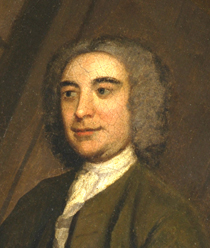John Wood, the Elder
| John Wood | |
|---|---|
 |
|
| Born | 1704 Twerton, England |
| Died | 23 May 1754 (Aged 49-50) Bath, England |
| Nationality | English |
| Occupation | Architect |
| Buildings | St John's Hospital, Prior Park, The Royal Mineral Water Hospital |
| Projects | Queen Square, North and South Parades, The Circus |
John Wood, the Elder, (1704 – 23 May 1754), was an English architect, working mainly in Bath.
In 1740 he surveyed Stonehenge and the Stanton Drew stone circles. He later wrote extensively about Bladud and Neo-Druidism. Because of some of his designs he is also thought to have been involved in the early years of Freemasonry.
His notable work in Bath included: St John's Hospital, Queen Square, Prior Park, The Royal Mineral Water Hospital, the North and South Parades and The Circus. Wood also designed important buildings outside Bath, including the reconstruction of Llandaff Cathedral, Buckland House, The Exchange, Bristol, and Liverpool Town Hall. He has been described by Nikolaus Pevsner as "one of the outstanding architects of the day".
Wood was born in Twerton near Bath, and baptised in St. James’s Church (now demolished). He received a good but basic education at King Edward's School. His father George was a local builder.
During his teenage years and early twenties, Wood worked for Robert Benson, the first Baron Bingley at his estate, Bramham Park, Yorkshire. He then became involved in speculative builds on the Cavendish estate in London.
...
Wikipedia
